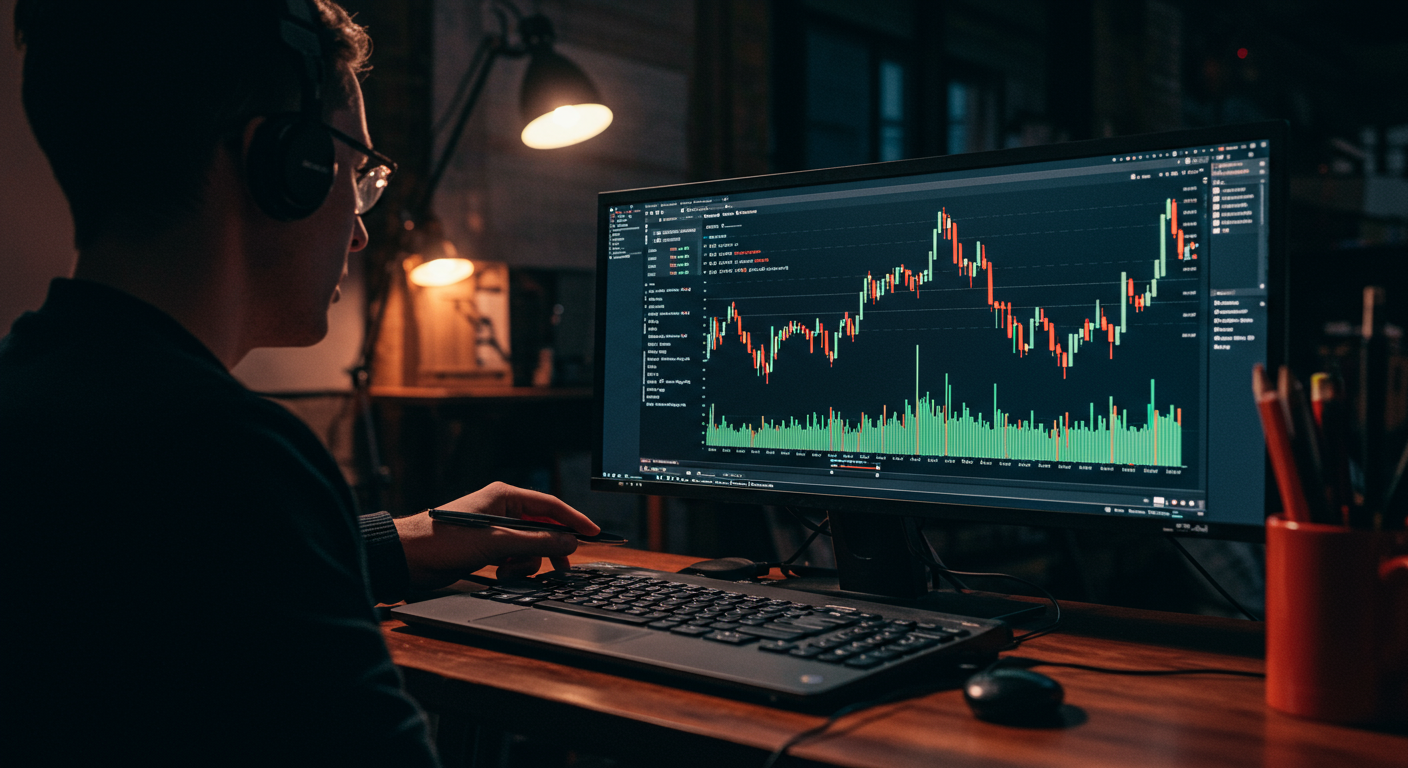Why This Got My Attention
So, I was scrolling through r/CryptoMarkets the other day, like I usually do to keep my finger on the pulse of the crypto world. And I saw this post that just hit me – simple, but super important. The title was blunt: "the only way to make 200$ every week is by scaming other users." The user was calling out the flood of posts promising easy weekly profits, warning people to be careful.
Honestly, it’s something we all need to hear regularly. The crypto space, while full of potential, is also a playground for scammers. They see the hype, the desire for quick gains, and they exploit it. These scams aren't always obvious either. They can be cleverly disguised as legitimate investment opportunities, trading bots, or even helpful guides. That’s why this Reddit post resonated so much – it's a reminder to stay vigilant.
The thing is, these “guaranteed” income streams are almost always too good to be true. If someone’s promising you a fixed weekly return with little to no risk, red flags should be waving like crazy. Crypto is volatile. It goes up, it goes down, and anyone who tells you they can predict it with certainty is probably lying. Or trying to sell you something.
And it's not just about losing money. Falling for these scams can also expose you to identity theft, malware, and other nasty stuff. So, let's break down some of these scams, how they work, and most importantly, how you can protect yourself. This isn’t just theoretical either; I've seen friends and family almost get caught up in these things, so it's personal for me too.

What I've Seen Out There
Okay, so what kind of scams are we talking about? There are a few common ones that keep popping up. First, there's the classic pump and dump. Scammers will hype up some obscure altcoin, get a bunch of people to buy it, and then dump their own holdings, leaving everyone else with worthless coins. They often use social media and Telegram groups to coordinate these pumps. It looks like easy money at first, but it rarely works out for anyone except the scammers.
Then there are the fake trading bots and “expert” advisors. These guys promise to automate your trading and generate massive profits with their secret algorithms. The catch? You have to pay for their bot or service, and often deposit your crypto into their platform. In reality, the bot either doesn't work, or the whole thing is just a Ponzi scheme, paying early investors with money from new ones.
Another one I've seen a lot is the fake ICO (Initial Coin Offering). Scammers will create a convincing-looking website and whitepaper for a non-existent crypto project, and then solicit investments. They'll promise huge returns once the coin launches, but of course, the coin never launches, and they disappear with the money. Always research the team behind any ICO, and be very skeptical of projects that promise unrealistic returns.
And don't forget the phishing scams. These are the ones where scammers try to trick you into giving them your private keys or login credentials. They might send you a fake email that looks like it's from your exchange, or create a fake website that looks identical to the real one. Always double-check the URL and be very careful about clicking links in emails.
What This Actually Means for You
So, you’re thinking about getting into crypto, or maybe you're already trading. What does all this scam talk actually mean for you? It means you need to be extra careful. Don't just blindly trust anyone who promises you easy money. Do your own research. Verify everything. And be prepared to walk away from anything that seems too good to be true.
If you're new to crypto, start small. Don't invest more than you can afford to lose. Learn the basics of blockchain technology, cryptocurrency wallets, and secure trading practices. There are tons of free resources available online, so there's no excuse for not doing your homework.
And be wary of anyone who pressures you to invest quickly. Scammers often use high-pressure tactics to get you to act before you have time to think. They might tell you that the opportunity is limited, or that the price is about to skyrocket. Don't fall for it. Take your time, do your research, and make your own decisions.
Another thing to keep in mind is that crypto is a long-term game. Don't expect to get rich overnight. Focus on building a solid portfolio of quality coins, and be prepared to hold them for the long haul. Trying to time the market or chase quick profits is a recipe for disaster.
Finally, remember that nobody is going to give you free money. If someone is offering you a free crypto giveaway or a guaranteed profit opportunity, it's almost certainly a scam. There's no such thing as a free lunch, especially in the crypto world.
The Stuff Nobody Talks About
Let's be real, nobody wants to talk about the dark side of crypto. Everyone's focused on the gains, the Lambos, and the revolutionary technology. But the truth is, risk management is just as important as finding the next hot coin. And one of the biggest risks is getting scammed.
So, what are some of the less-obvious risks to watch out for? One is the risk of rug pulls in DeFi (Decentralized Finance). This is where the developers of a DeFi project suddenly abandon it, taking all the investors' money with them. This can happen even with seemingly legitimate projects, so it's important to do your research and understand the risks before investing in any DeFi protocol.
Another risk is the risk of exchange hacks. Even the biggest crypto exchanges are vulnerable to hacking, and if your coins are stored on an exchange, they could be stolen. That's why it's important to use a hardware wallet to store your crypto offline, where it's safe from hackers.
And don't forget the risk of regulatory changes. Governments around the world are still trying to figure out how to regulate crypto, and new regulations could have a significant impact on the market. Be prepared for the possibility that your favorite coin could be banned or heavily restricted in your country.
Finally, there's the risk of your own mistakes. Crypto is still a relatively new and complex technology, and it's easy to make mistakes that could cost you money. Be careful about sending crypto to the wrong address, or losing your private keys. Always double-check everything before you hit send.
If You're Trading from Outside the US
If you're trading crypto from outside the US, there are a few additional things to keep in mind. First, tax laws vary widely from country to country. In some countries, crypto is taxed as property, while in others it's taxed as income. Make sure you understand the tax laws in your country, and keep accurate records of all your crypto transactions.
Second, crypto regulations also vary from country to country. Some countries have embraced crypto, while others have banned it outright. Check the regulations in your country before you start trading, and be aware of any restrictions or limitations. For example, some countries may have restrictions on the amount of crypto you can buy or sell, or on the exchanges you can use.
Third, be aware of currency exchange rates. If you're trading crypto in a currency other than your local currency, you'll need to factor in the exchange rate when calculating your profits and losses. Exchange rates can fluctuate significantly, so it's important to keep an eye on them.
Finally, be careful about using VPNs to access crypto exchanges. Some exchanges prohibit the use of VPNs, and using one could get your account suspended. Check the terms of service of your exchange before using a VPN.

Actually Doing This Stuff
Okay, so how do you actually protect yourself from crypto scams? Here's a step-by-step guide:
- Do your research: Before investing in any crypto project, read the whitepaper, research the team, and check their social media presence. Look for red flags like unrealistic promises, lack of transparency, or a history of scams.
- Use a secure wallet: Store your crypto in a hardware wallet or a reputable software wallet that supports two-factor authentication. Never store your crypto on an exchange for long periods of time.
- Be careful about phishing: Always double-check the URL of any website you visit, and be wary of clicking links in emails or social media posts. Never enter your private keys or login credentials on a website unless you're absolutely sure it's legitimate.
- Use strong passwords: Use a strong, unique password for every account you have, and enable two-factor authentication whenever possible.
- Be skeptical of guaranteed returns: If someone is promising you a guaranteed return on your crypto investment, it's almost certainly a scam. There's no such thing as a risk-free investment, especially in the crypto world.
- Report scams: If you encounter a crypto scam, report it to the exchange, the social media platform, and the relevant authorities. This will help protect other people from falling victim to the same scam.
My Take on All This
Look, I'm not trying to scare you away from crypto. I believe it has the potential to change the world. But it's important to be realistic about the risks, and to protect yourself from scams.
The crypto space is still the Wild West in many ways. There are a lot of bad actors out there, and it's up to each of us to be vigilant and protect ourselves. Don't let the hype and the promise of quick riches blind you to the dangers.
Do your own research, be skeptical of anything that sounds too good to be true, and never invest more than you can afford to lose. And if you do get scammed, don't be ashamed to talk about it. Sharing your experience can help others avoid making the same mistake.
Maybe I'm wrong, maybe I'm being too cautious. But I'd rather be safe than sorry when it comes to my crypto investments. And I hope you will too. Stay safe out there, and happy trading!